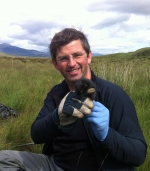University of Aberdeen

| Current Position | Professor of Ecology |
| Telephone | +44 (0)1224 273259 |
| x.lambin@abdn.ac.uk | |
| Departments | School of Biological Sciences |
| ECR | No |
| Quadrat Core Themes | Biodiversity, Environmental Management |
| Methods I Use | Bio / Geo / Chemical Analytical, Modelling |
| Profiles |
Key Research Interests
- Predation and spatial dynamics (and more broadly ecosystem dynamics and species interactions)
- Invasive species management (including participatory approaches and spatial planning)
- Metapopulation dynamics, trophic interactions including pathogens-host and dispersal
- Conservation, people and rewilding and re-assembling ecosystems
- Disease host dynamics as a trophic interactions and link to land use changes and globalisation
Recent Key Papers
- Sheehy, E., Sutherland, C., O’Reilly, C., and Lambin, X. (2018) The enemy of my enemy is my friend: Native pine marten recovery reverses the decline of the red squirrel by suppressing grey squirrel populations. Proceedings of Royal Society, Series B 285: 20172603.
- Melero Y, Cornulier T, Oliver MK, Lambin X. (2018) Ecological traps for large-scale invasive species control: Predicting settling rules by recolonising American mink post-culling. Journal of Applied Ecology 55, (4) 769-1779
- Millon A, SJ Petty, B Little, O Gimenez, T Cornulier, and X Lambin (2014) Dampening prey cycle overrides the impact of climate change on predator population dynamics: a long‐term demographic study on tawny owls. Global Change Biology 20(6), 1770-1781
Summary Title of Current Studentships
- Doing more with less: adaptive management of American mink population;
- Understanding the generation and dynamics of Bartonella diversity in fragmented host populations;
- A multi-scale bio-economic approach to optimising the management of emerging rodent crop pests;
- Assessing the economic and conservation impacts of the pine marten, a recovering predator, on non-native grey squirrels, and forest land management.
- Adaptive monitoring and management for endangered species conservation in boreal forest ecosystems with newly enriched guild of predators.
- Optimising rodent control strategies in rural Madagascar to increase agricultural productivity and reduce zoonotic disease risk through targeted community actions.
- Leaving the safety of the forest: spatial dynamics of the goshawks within and outside protected area.
- Quantifying connectivity in fragmented population;
- Population dynamics of voles: Characterization and modelling of global spatio-temporal patterns;
- QUADRAT DTP student, Anna Kellner: Rewilding and the return of interacting meso-predators: Understanding, modelling and monitoring predator-prey dynamics in non-equilibrium ecosystems (a CASE project supported by Forestry England);
- QUADRAT DTP student, Elouise Mayall: Searching for a bit of peace and quiet despite unreliable cues: dispersal, settlement, and fitness of a top predator in multi-use forests (a CASE project supported by Forestry & Land Scotland, Forestry England & Tillhill Forestry).

 PURE
PURE ORCID
ORCID



















































